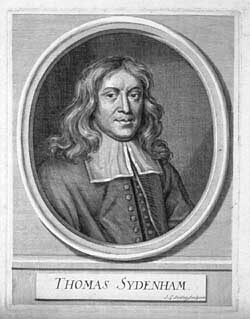Thomas Sydenham (1624-89) and John Locke (1632-1704)
Thomas Sydenham (1624-89) was educated at Oxford and at Montpellier. He was well acquainted with the works of the ancient physicians, and probably fairly so with chemistry. Of his knowledge of anatomy nothing definite can be said, as he seldom refers to it. His main avowed principle was to do without hypothesis, and study the actual diseases in an unbiased manner.
As his model in medical methods, Sydenham repeatedly and pointedly refers to Hippocrates, and he has not unfairly been called the English Hippocrates. He resembled his Greek master in the high value he set on the study of the "natural history of disease"; in the importance he attached to "epidemic constitution," that is, to the influence of weather and other natural causes in modifying disease; and further in his conception of the healing power of nature in disease, a doctrine which he even expanded beyond the teaching of Hippocrates.
According to Sydenham, a disease is nothing more than an effort of nature to restore the health of the patient by the elimination of the morbific matter. The extent to which his practice was influenced by this and other a priori conceptions prevents us from classing Sydenham as a pure empiric, but he had the rare merit of never permitting himself to be enslaved even by his own theories. Still less was his mind warped by either of the two great systems, the classical and the chemical, which then divided the medical world.
Sydenham’s influence on European medicine was very great. His principles were welcomed as a return to nature by those who were weary of theoretical disputes. He introduced a milder and better way of treating fevers, especially small-pox, and gave strong support to the use of specific medicines, especially Peruvian bark. He was an advocate of bleeding, and often carried it to excess.
Another important point in Sydenham’s doctrine is his clear recognition of many diseases as being what would be now called specific, and not due merely to an alternation in the primary qualities or humours of the older schools. From this springs his high appreciation of specific medicines.
One name should always be mentioned along with Sydenham -- that of his friend John Locke. The great sensational philosopher was a thoroughly trained physician, and practised privately. He shared and defended many of Sydenham’s principles, and in the few medical observations he had left shows himself to be even more thorough-going than the "English Hippocrates." It is deeply to be regretted in the interests of medicine that he did not write more. It is, however, reasonable to suppose that his commanding intellect of ten itself felt in the words of Sydenham. One sentence of Locke’s in a letter to W. Molyneux sums up the practical side of Sydenham’s teaching.
"You cannot imagine how far a little observation carefully made by a man not tied up to the four humours [Galen], or sal, sulphur, and mercury [Paracelsus], or to acid and alkali [Sylvius and Willis] which had of late prevailed, will carry a man in the curing of diseases though very stubborn and dangerous; and that with very little and common things, and almost no medicine at all."
We thus see that, while the great anatomists, physicists, and chemists, men of the type of Willis, Borelli, and Boyle, were laying foundations which were later on built up into the fabric of scientific medicine, little good was done by the premature application of their half-understood principles to practice. The reform of practical medicine was effected by men who aimed at, and partly succeeded in, rejecting all hypothesis and returning to the unbiased study of natural processes, as shown in health and disease.
Sydenham showed that these processes might be profitably studied and dealt with without explaining them; and, by turning men’s minds away from explanations and fixing them on facts, he enriched medicine with a method more fruitful than any discoveries in detail. From this time forth the reign of canonical authority in medicine was at an end, though the dogmatic spirit long survived.
Read the rest of this article:
Medicine - Table of Contents
